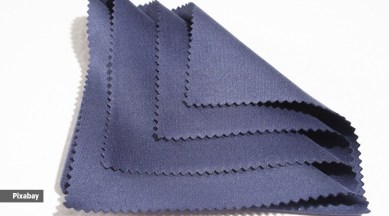📣 For more lifestyle news, click here to join our WhatsApp Channel and also follow us on Instagram
Can polyester underwear affect fertility, cause impotence?
"There is no doubt that it is one of the most popular synthetic materials available almost everywhere, but based on studies, polyester should not touch your skin," said Dr Akta Bajaj, senior consultant and head-obstetrics, gynaecology, Ujala Cygnus Group of Hospitals

Just like we are what we eat, our body also is susceptible to our choice of fabric and is affected by what we wear. As such, if biohacker Tim Gray’s analysis is to be believed, polyester fabric (or polyethylene terephthalate (PET)), which is a synthetic or man-made fiber material made by combining coal, oil, and water, can affect fertility in both men and women.
“It can cause severe reproductive problems, in both men and women. Miscarriages, infertility, sterility, and impotence have all been linked to polyester clothing,” Gray shared in an Instagram video.
monthly limit of free stories.
with an Express account.
Addressing how polyester underwear causes a lack of breathability and affects reproductive functioning, Gray quoted a National Institutes for Health (NIH) study from 1992 which noted that polyester can, in fact, act as a 100 per cent contraception for men.
The study, which was conducted in 14 men over 12 months, noted that fertile men can be rendered azoospermic by wearing the polyester sling. It is a safe, reversible, acceptable, and inexpensive method of contraception in men, it read.
It further mentioned that the azoospermic effect of the polyester sling seems to be due to two mechanisms:
– the creation of an electrostatic field across the intrascrotal structures
– disordered thermoregulation
Another study which was conducted on 24 dogs divided them into two groups: one group served as the control group, and the other group was made to wear polyester shorts. “After 24 months, the dogs wearing polyester had azoospermia, a condition where there are no sperm in the semen, and their spermatogenesis was disrupted. There were also degenerative changes in the seminiferous gland, which produces sperm,” said Dr Ruchi Bhandari, consultant gynaecologist, infertility specialist and cosmetic gynaecologist, Mishka IVF Centre.
Calling polyester as “endocrine-disrupting”, Dr Shrey Srivastav, MD (Internal Medicine), Sharda Hospital said that the chemicals in polyester disrupt testosterone production. “The electrostatic charge generated by polyester was responsible for the significant decline in sperm count, as per the study,” he mentioned.
Dr Akta Bajaj, senior consultant and head-obstetrics, gynaecology, Ujala Cygnus Group of Hospitals agreed and elaborated on possible causes for synthetic fabrics such as polyester negatively affecting fertility. “These days, polyester is a commonly used synthetic material for underwear. It has been shown to hold in heat and is less breathable than other materials. The testicular temperature may rise due to such material, leading to scrotal heat stress,” said Dr Bajaj.
In women, microplastics have been found in the placenta as well, said Dr Arunima Haldar, consultant – IVF and reproductive medicine, Manipal Hospital, Varthur, Bangalore. “Polyester can be the cause of miscarriages and implantation failure in women,” added Dr Haldar.
She also mentioned that continuous use of such material may also lead to insomnia, kidney, and skin ailments. “There is no doubt that it is one of the most popular synthetic materials available almost everywhere, but based on studies, polyester should not touch your skin. Also, when you sweat in polyester, it releases Antimony Oxide, a chemical that is partially dissolved in sweat and then absorbed by the skin. Antimony is a known carcinogen and can cause liver, heart, kidney, and skin ailments,” Dr Bajaj told indianexpress.com.
It can cause rashes, itching, redness, dermatitis blistering of the scrotal skin, said Dr Haldar. “Polyester is basically plastic and can break down into microplastics, which can release a lot of chemicals that can be absorbed effectively from the scrotal skin,” he added.
So, what should you be opting for?
Experts suggsest that it is important to note that the studies conducted so far have limitations and further research is needed to fully understand the potential effects of polyester on human health. “In the meantime, individuals who are concerned about the effects of polyester on their fertility and overall health may consider wearing clothing made from natural materials,” said Dr Bhandari.
Dr Bajaj mentioned that it is best to go for natural fabrics like organic cotton, silk, and wool.
📣 For more lifestyle news, follow us on Instagram | Twitter | Facebook and don’t miss out on the latest updates!
📣 For more lifestyle news, click here to join our WhatsApp Channel and also follow us on Instagram